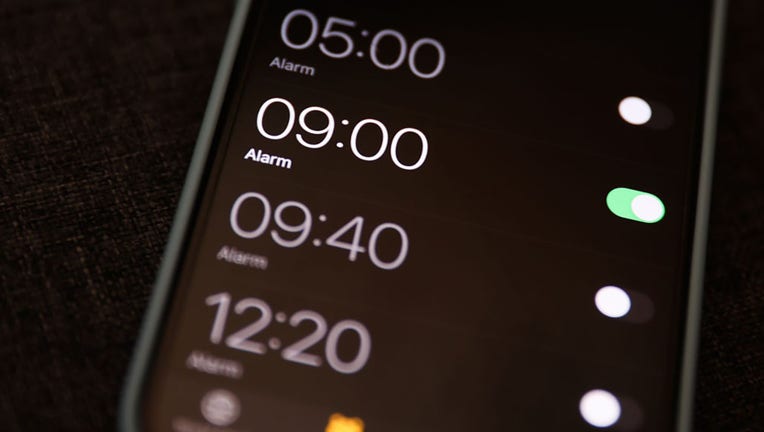How many alarms do you set in the morning? Sleep expert shares ideal number

FILE - Alarm on clock app is seen displayed on iPhone 15 Pro in this illustration photo taken in Poland on Aug. 6, 2024. (Photo by Jakub Porzycki/NurPhoto via Getty Images)
What is the ideal number of alarms to wake up in the morning? If your answer is more than one, you may be jeopardizing your quality of sleep.
"My general advice is that you set one alarm," said Dr. Alicia Roth, a sleep psychologist for the Cleveland Clinic. "The more alarms you have, the harder it's going to be for you to wake up in the morning."
The more times one hits the snooze button, which can be tempting to get that extra 15 minutes of shut-eye, the more they’re interrupting their sleep cycle, Roth said.
Tips for better sleep with one alarm

The benefits of good sleep
Most adults need 7 or more hours of quality sleep each night, according to the National Institutes of Health. Kids and teens need even more.
Roth stressed that it’s best to set an alarm for the time a person actually has to wake up. If they’re used to multiple alarms, Roth said it’s OK to "slowly work your way down to one over time."
Setting up the alarm clock away from the bed, so that the person needs to physically get up and walk over to turn it off, can also help.
RELATED: Google searches for 'sleep' reached all-time high in 2023
Additionally, keeping one’s sleep schedule on the weekends the same as during the week can be helpful too.
"A lot of us have a tendency to go to bed and wake up later on the weekends than on weekdays," Roth said. "This makes it really difficult to wake up on Monday morning and prompts us to have multiple alarms or snoozes."
Those who find it really difficult to get up in the morning may be suffering from an underlying sleep disorder, Roth noted – adding that a sleep specialist can help with any recurring sleep issues that begin to impact everyday life.
Average amount of sleep Americans get at night
Quality sleep has a lot of benefits for both one's physical health and mood. However, a Gallup poll published earlier this year found that people are not getting nearly the amount of sleep they should.
The poll revealed that only 26% of people said they get eight hours of sleep, compared to 53% of respondents who said they get six to seven hours, according to the poll, which was conducted in December.
Some 20% shared that they only get five or fewer hours of sleep per night, a slight increase from 14% of people who reported getting less rest in 2013.
Gallup also noted that women appear to be getting less sleep compared to men. Approximately 36% of women said they get sufficient rest, while 48% of men said they get enough sleep.
Younger women, under the age of 50, were especially likely to report they weren't getting enough rest. The poll noted that adults 65 and older were more likely than younger groups to get the sleep they need.

